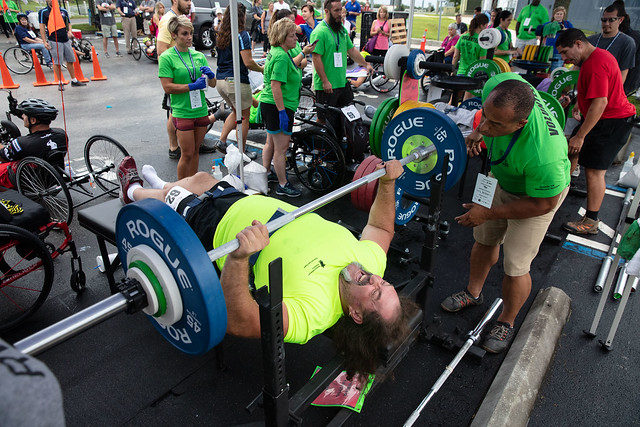
The new team relay will have a military theme at this year’s Wheelchair Games, like shot put grenades. If the shot put grenade makes it to a bunker, the team gets double points.
The National Veterans Wheelchair Games are getting a makeover in their 39th year, with a sport that will test brute strength, leadership, skill and a little brain power.
The team relay, which includes a “grenade toss,” and “shooting,” may feel like a return to basic training, but Troy Colón, who put together the event, said it’s just to add some military flair for the Veteran-athletes.
“This is a throwback to their military days and that military camaraderie, but it is a thinking game,” he said. “Think before you act, and you may want to choose finesse over strength.”
The 39th Annual Wheelchair Games–a partnership with VA and the Paralyzed Veterans of America–takes place July 11 to 16 in Louisville, Kentucky. The Games feature a variety of competition for wheelchair Veterans from VAs across the nation, as well as Puerto Rico and a team from Great Britain.
Some events include wheelchair rugby, power soccer, handcycling, and other track and field events.
Colón, an assistive technology professional from the Louisville VA Medical Center in Kentucky, said the team relay takes a little bit from different parts of the Games.
25 teams–made up of five athletes each–will participate in this year’s relay. Each team must have at least one quadriplegic. Once one athlete completes a station, he or she will have to wheel over to the next station in the relay.
Here’s how the relay is set up:
- Powerlifting: This is the first station and any of the five team members can participate. The higher the weight, the more points the team receives, but they only have two minutes.
- Shot put grenades: After powerlifting, the team makes their way to the second station. Like in a traditional shot put, the further the distance, the more points. But if the athlete gets this shot put in one of the bunkers, they will get double points for that distance.
- Laser tag shooting: Again, speed is a factor. “I’m going to make the shooters race over,” Colón says. “They’re going to be out of breath, they’re going to be shaky. It’s about trigger control and breath control. You might be racking up points by hitting the target, but taking longer and getting points deducted there. What are you willing to risk?”
- Sled pool: “This could be the most grueling part if the best decisions aren’t made,” Colón said. Like an adaptive version of a crossfit exercise, one person must pull a certain amount of weights from Point A to Point B. “There’s a smart way to do this,” Colón said. “Team captains should think outside the box.”
- Rock climbing: The final leg of the relay will add the “shock and awe,” Colón said. The last person on the team will be staged and ready to go, but can’t climb until the person on the sled pull makes it up the hill to the final station.
The team with the highest overall points–not necessarily the fastest time–will win the relay.
“People are intimidated by what they can and can’t do, but just like the military, if everybody could do everything, everybody would have a patch. For the relay, it’s easier if you read the rules, and intelligently think about it. Think about the best place for all your team members,” Colón said.
“The team captain needs to read my rules very, very carefully because I purposely wrote the rules to trick people,” he added. “It’s one of those things like the military, where you’re only as good as your intel. You have to be adaptive when you are doing missions. You can’t always go by the textbook.”
However it’s played, Reese Levasseur, a Marine Corps Veteran from the Palo Alto VA Medical Center, said he’s ready.
“The funny thing is, I’ve been practicing the sled pull for training at our local adaptive gym, so I’m ready for this,” he said. “It’s going to be a great experience, and being a Marine, we’re just super competitive in nature.”
But if super competitive doesn’t equal best score, he’s OK with that, too.
“Hopefully I’m not the one who screws it up too bad,” he laughed. “I’m laid back, but we’re all about enjoying ourselves out there. We hope to be top dogs, but it’s more about being together and doing things in a chair instead of sitting on a couch at home.”
Topics in this story
More Stories
VA delivers the care you have earned—whenever and wherever you need it.
Face it, muscle tension is not good for your health, but you can do something about it in 15 minutes!
For a group of Veterans at the Central Virginia VA Health Care System, Parkinson’s care includes a regular check-in to see what they’ve built with Legos.






Your are a furious competitor , as you picked your equipment up from the cage I knew you was a winner. Get that Gold.
Very nice sir
Go get ’em my Veteran brothers and sisters. Good luck .
doing a great work team. Wheel chair player doing such a hard work.